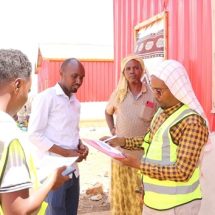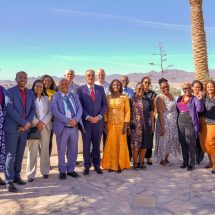38 Certificates of Land Occupancy issued in Bulemu, Zambia
On 30th November, 2016, the UN Habitat/ Global Land Tool Network in partnership with other stakeholders in the Zambian lands sector participated in an inauguration ceremony on the issuance of land occupancy certificates for the Bulemu Village, towards improved tenure security on customary land in Lusaka, Zambia. The event was attended by dignitaries from the land sector in Zambia who included: the Permanent Secretary Ministry of Housing and Infrastructure Development; Chairperson of House of Chiefs; former Chisamba Member of Parliament and Headperson; Chisamba District Chairperson; Director Chiefs Affairs; Ministry of Chiefs and Traditional Affairs; Chisamba District Commissioner; and UN Habitat/ GLTN technical officers. Community members from Bulemu Village also attended in large numbers.
This successful event builds upon the Mungule Chiefdom experiences in a project between the UN-Habitat/GLTN and Huairou Commission, in collaboration with local partners in Lusaka Zambia to support grassroots women to better measure the social tenure relationships of women over land, housing and natural resources living under customary tenure using STDM. Under this agreement, STDM was piloted in Mungule Chiefdom, Chibombo District in the periphery of Lusaka, where Huairou Commission implementing partners included Chieftainess Mungule. Mungule Ward Council, Village Headmen and Women, local community members, People’s Process on Housing and Poverty in Zambia/Zambia Homeless and Poor Peoples Federation (PPHPZ/ZHPPF) and Katuba Women Association.
Chief Chamuka stressed that the certificates will help in the reduction of land dispute cases that have been rampant in the past, while at the same time monitoring the allocation of land by headmen/chiefs. He also remarked that the process has been very instrumental in the auditing of land in the village and called for the scaling up the activity to cover the whole chiefdom. He noted that this would provide spatial and socio-economic data for future infrastructural and services planning. He went on to laud the process for having built the capacity of the local community members with enumeration and basic mapping skills, a very critical element for the long-term sustainability of the process. In his closing remarks, Chief Chamuka appreciated the government of Zambia’s recognition to providing security of tenure to all customary land and allowing for the issuance of provisional customary certificate signed by village head persons to improve tenure security. He however appealed to the National Government to deliver on the new legislative framework currently under development, to enhance tenure security on customary land. Chief Kaputa (House of Chiefs Chairperson), also present during the event, requested for similar support towards issuance of customary certificates in his Chiefdom.
In total, 38 certificates were issued. This event marked the culmination of UN-Habitat’s partnership with Huairou Commission, People’s Process on Housing and Poverty in Zambia (PPHPZ), traditional leadership and Village Development Committees on enumerations and mapping using GLTN tools in Chamuka Chiefdom, Chisamba District.
Zambia has a dual land tenure system; customary tenure and leasehold tenure. Section 7 of the Lands Act 1995 recognizes the existence of customary tenure in Zambia and guarantees women and men the possibility of being land owners with security of tenure for 99 years but impediments in its application have continued to limit access to land especially to women and the poor. The lack of proper tenure security provisions for customary land cause customary lands in Zambia to be under constant pressure from urban expansion, especially in the vicinity of the nation’s capital city, Lusaka with ribbon settlements sprawling along transport corridors leading in and out of the city.
[masterslider id=”6″]












